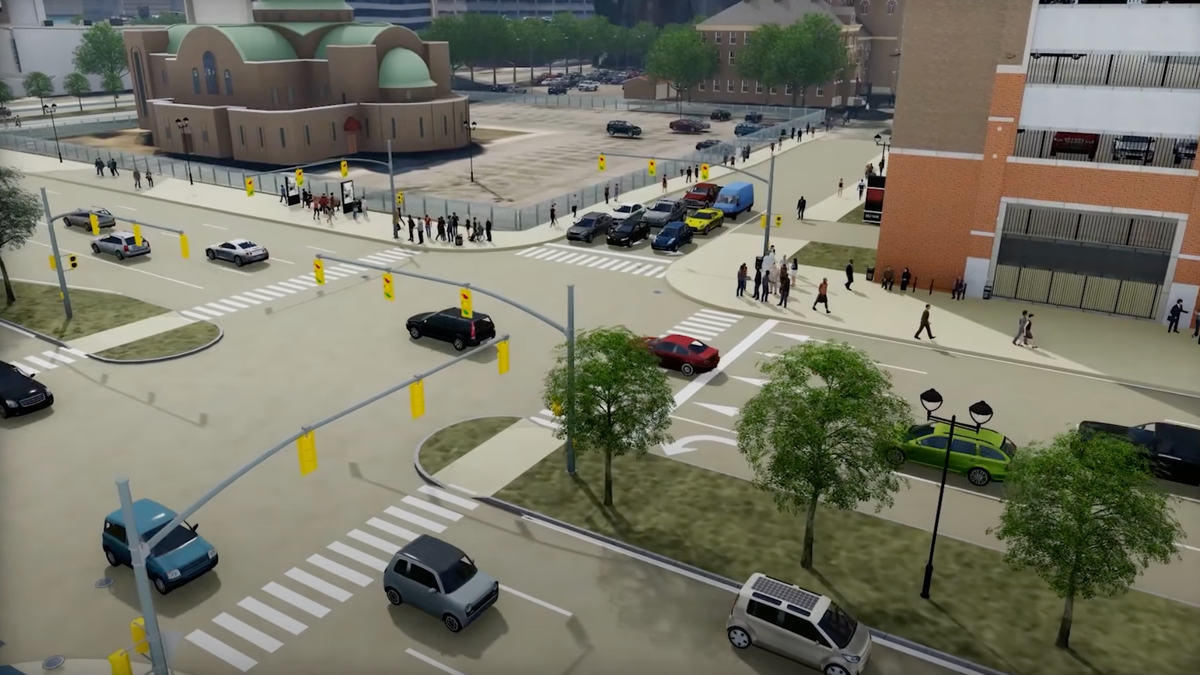The removal of the shortest freeway in the U.S., the I-375 interstate in Detroit, was lauded as a step in the right direction in terms of both honoring historical racial justice and digging out a useless, polluting, alienating piece of infrastructure. But instead of green space and quiet streets, Detroiters will get… a seven-lane road, which will reach nine lanes at its widest.
Boy, if there’s one thing my home city of Detroit really knows how to screw up, it’s a good thing. At a little over a mile long, the eight-lane stretch starts and ends on the East Side of Detroit’s downtown. Outlier Media reminded me of this ridiculously depressing bit of infrastructure shenanigans just this week:
Voices in opposition have been growing in volume in recent weeks, but it’s unclear how much they can change. Most of the deal is already in the bag. The project is estimated to cost at least $300 million with significant funding locked down and the design largely in place. MDOT is expected to hire a design and construction team early next year.
Transit advocates, planners, local stakeholders and residents say the current design is too focused around the concerns of drivers and puts pedestrian safety at risk.
“It’s a real missed opportunity for the city because the road is so wide that it’s going to effectively feel like a highway by another name,” said Bryan Boyer, a resident of nearby Lafayette Park and professor at the University of Michigan’s Taubman College of Architecture and Urban Planning. “Instead of reconnecting communities, it is going to make a bigger gulf between downtown and the eastside. Instead of being safer for people who are walking or biking, particularly in the east-west direction, it’s going to be more dangerous.”
The redesign, called the I-375 Reconnecting Communities Project, is happening during a larger movement across the country to undo damage caused by freeway construction in the 1950s and 1960s to Black and brown neighborhoods.
The I-375 Reconnecting Communities Project basically put in some traffic lights and crosswalks and added a grassy median across the same amount of lanes as the freeway and called it a day. Oh, and some benches, cause who wouldn’t want to linger in front of seven to nine lanes of busy traffic in a state without any car inspection laws?
Decades after the destruction of the once-thriving Black neighborhoods of Paradise Valley and Black Bottom, there isn’t much of a neighborhood left in this area for the I-375 Reconnecting Communities Project to really reconnect. Now, on one side of the freeway is a multi-lane service drive and the parking garage for the Greektown casino and, on the other, a service drive running along mostly apartment buildings designed to negate the sounds of the busy freeway. In short, it’s just not a friendly stretch of street anymore, and there’s no getting back what was destroyed.
Not that this new Stroad will be all that different from the other main drags in Detroit, such as Jefferson Avenue or Woodward, both of which run multiple lanes in either direction. In fact, it’s quite keeping in the city’s 115-year history of putting cars ahead of people.
Tearing down freeways has become a popular movement in cities around the world and here in America. While incredibly useful for cross-country travel, many cities used federal money meant for interstate development to plow through Black neighborhoods in cities. And there are a ton of benefits in removing freeways, from opening up more living space to reducing both noise and air pollution.
Cities across the country have reclaimed their cities from freeways, including Chattanooga, Tennessee, which removed a riverfront from a four-lane highway. The area is now one of the most heavily invested-in parts of the city, according to Public Square from the Christopher Newport University.

